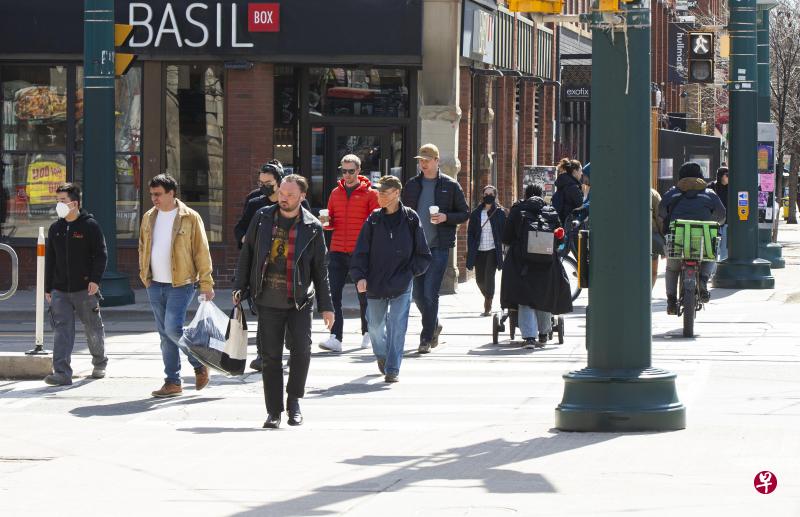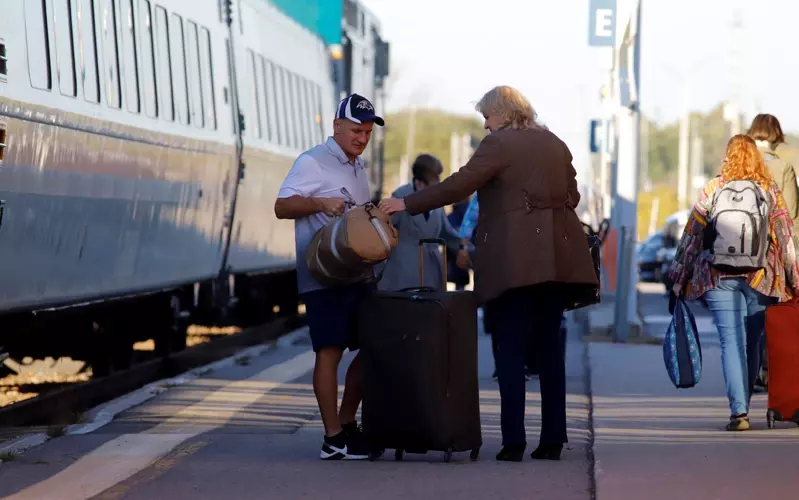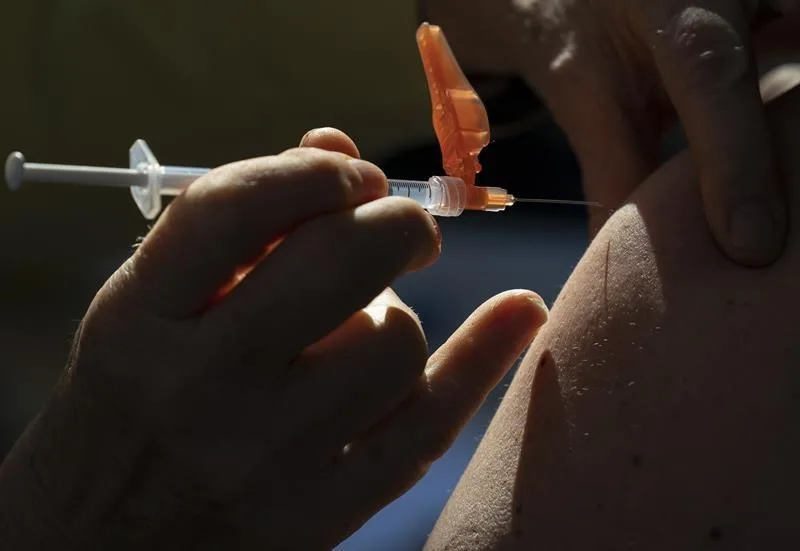加拿大放宽入境防疫措施 疫情反弹
文 / 李月霞
4/02/2022

(早报讯)加拿大的入境防疫措施自4月1日起进一步放宽,完成冠病疫苗接种者入境时不再需要提供病毒检测报告。
这一措施适用于通过陆路、航空或水路口岸入境的所有旅客。不过,旅客仍然有可能面对随机抽检,进行病毒分子测试。在等候抽检结果期间,旅客不需要接受强制隔离。
中国新闻社报道,另外,旅客仍然需要在入境加拿大72小时之前通过ArriveCAN手机应用程序或相应的官方网站填报防疫相关信息,并上传英文或法文的电子版疫苗接种证明。

加联邦政府在3月中旬宣布了上述放宽入境防疫限令的新举措。但最近两周,加拿大整体疫情正出现较明显的反弹趋势。
路透社引述加拿大首席公共卫生官谭咏诗4月1日的话说,截至3月31日,全国七天日均新增病例数为28%,表明疫情正在反弹。她建议民众继续戴口罩。
在3月末,安大略省疫情科学咨询小组负责人已指出,安大略省“十分清楚”地正处在第六波疫情中。魁北克省公共卫生研究院也认为,该省已迎来第六波新冠疫情。安大略和魁北克分别是加拿大累计报告病例数排在第一、二位的省份。
加政府已从2月底开始放宽多项入境防疫措施,多个省份随后陆续放宽公共防疫限令,以促进经济重启。

加拿大將祭強制令 公僕、軍警與旅客都得打疫苗
中央社 / 渥太華
10/06/2021

加拿大官員今天宣布,聯邦職員、軍警和國內航空、鐵路及船運旅客將須完整接種COVID-19(2019冠狀病毒疾病)疫苗。
加國總統理杜魯道(Justin Trudeau)最近在一場競選活動中,提出強制接種疫苗的政策,對象涵蓋30萬名政府雇員。
法新社和路透社報導,在本月底前未接種疫苗又未獲得醫療豁免證明者,將留職停薪。
此外,12歲以上的航空和鐵路旅客也都須在11月底前完整接種疫苗。
加拿大副總理方慧蘭(Chrystia Freeland)在記者會中表示:「這些負責、務實且艱巨的行動…將保護加拿大人民,避免我國醫療體系不堪負荷,也讓我們的孩子得以繼續上學,並加速經濟復甦。」
她說,這也將確保「(反對接種疫苗的)少數人無法破壞加拿大的經濟復甦」。
根據疫苗追蹤網站COVID-19 Vaccination Tracker,加拿大12歲以上人口超過82%已完整接種疫苗,88%至少施打一劑。
加拿大負責公共服務管理的國庫委員會(Treasury Board)表示,聯邦職員有近30萬人,約聘人員則有95萬5000人,占加拿大全職勞工約8%。
加拿大南方鄰邦美國上月表示,大多數的聯邦雇員必須在11月22日前完整接種COVID-19疫苗;而聯邦承包商則須在12月8日前施打。美政府也草擬法規,要大企業雇主必須要求員工接種疫苗,或每週進行篩檢。
Canada makes vaccines mandatory for public servants, air and rail workers, travelers
The Canadian Press
10/06/2021

OTTAWA — The core public service, air travel and rail employees and passengers must all be fully vaccinated against COVID-19 by the end of October, according to Canada’s new mandatory vaccine policy.
The federal government announced Wednesday public servants must attest they are fully vaccinated against COVID-19 by Oct. 29, or be put on unpaid administrative leave.
Meanwhile, the government is working with employers of airport businesses, airline and rail companies to develop their own mandatory vaccine policies by the end of the month.
Anyone over the age of 12 who plans to hop aboard a plane at a Canadian airport or Via Rail or Rocky Mountaineer train must have received a second dose of a Health Canada-approved vaccine at least 14 days before their travels.
For travellers, there will be a short transition period to allow the unvaccinated to show a negative molecular COVID-19 test instead, though the grace period will last only until Nov. 30.
Cruise companies will also be asked to implement mandatory vaccines for employees and travelers in time for the 2022 season.
The new policy will affect more than 267,000 core public-service and RCMP workers, and will apply even to those who work from home and outside of the country.
“This … is about the government taking action on behalf of that majority who spoke in the election, to be sure that a minority of people cannot sabotage Canada’s economic recovery and cannot allow the fourth wave or other variants to cause real problems for us,” Deputy Prime Minister Chrystia Freeland said at a press briefing Wednesday.
But the Public Service Alliance of Canada (PSAC), which represents more than 160,000 federal workers, said the government did not properly consult with bargaining agents or incorporate any feedback from unions.
“We see that this is being rushed, without meaningful consultation,” said Chris Aylward, PSAC national president.
The Treasury Board Secretariat of Canada did not immediately respond to a request for comment.
The union has questions about how the government plans to protect workers’ private health information and how it will keep unvaccinated contract workers and visitors out of federal workspaces, he said.
“And of course, human rights, members’ human rights must be protected under the Canadian Human Rights Act, including the duty to accommodate,” Aylward said.
Workers will have to provide an attestation of their vaccine status online. The attestations will be tracked and audited by departments, and managers can ask for proof of vaccination at any time.
Employees who provide false attestations will be punished with disciplinary action, including firings.
People who have had only one dose will be given 10 weeks to get their next one before they are put on unpaid leave.
They will not be allowed back at work until they are either vaccinated or the policy is no longer in effect.
Employees put on unpaid leave will generally not qualify for employment insurance benefits, officials said.
Aylward said options should be explored to accommodate unvaccinated workers.
“What about if this work can be done remotely? What about reassignment of duties? None of that was explored,” he said.
But the government has opted for a blunt approach.
“It’s very straightforward. If you want to continue to work for the public service of Canada, you’re going to need to be fully vaccinated,” Prime Minister Justin Trudeau said Wednesday.
Approximately 82 per cent of eligible Canadians have received a double dose of Health Canada-approved vaccines.
PSAC does not have a record of how many of its members are vaccinated, but expects the vast majority have had their shots.
There will be accommodations made for people who are unable to receive a vaccine on grounds protected under the Canadian Human Rights Act, which includes religious and health reasons for not having a full slate of vaccines.
Prime Minister Justin Trudeau said exemptions will be difficult and onerous to obtain, and simply having a personal conviction that vaccines are “bad” will not be sufficient.
The policy will be reviewed every six months, as it is closely tied to public health measures.
Stephane Aubry, vice-president of the Professional Institute of the Public Service of Canada (PIPSC), said his union is concerned about how those accommodations will play out.
While his union is not planning to challenge the new policy, they may have to file grievances on a case-by-case basis, he said.
“This is a concern for us because it’s pressure on the employees, and we will defend our members as much as we can,” Aubry said in an interview Wednesday.
The Union of Canadian Correctional Officers wrote to members that it will represent them through the grievance process if they choose not to get a COVID-19 vaccine, but warned the process could take two or three years and there is no court precedent that could predict the outcome.
Other federally regulated workplaces like Crown corporations and government agencies will be asked to mirror the public service mandatory vaccine policy for their employees.
The acting chief of the defence staff Gen. Wayne Eyre will also issue a directive requiring vaccination for the Canadian Armed Forces.
This report by The Canadian Press was first published Oct. 6, 2021.
Laura Osman, The Canadian Press




